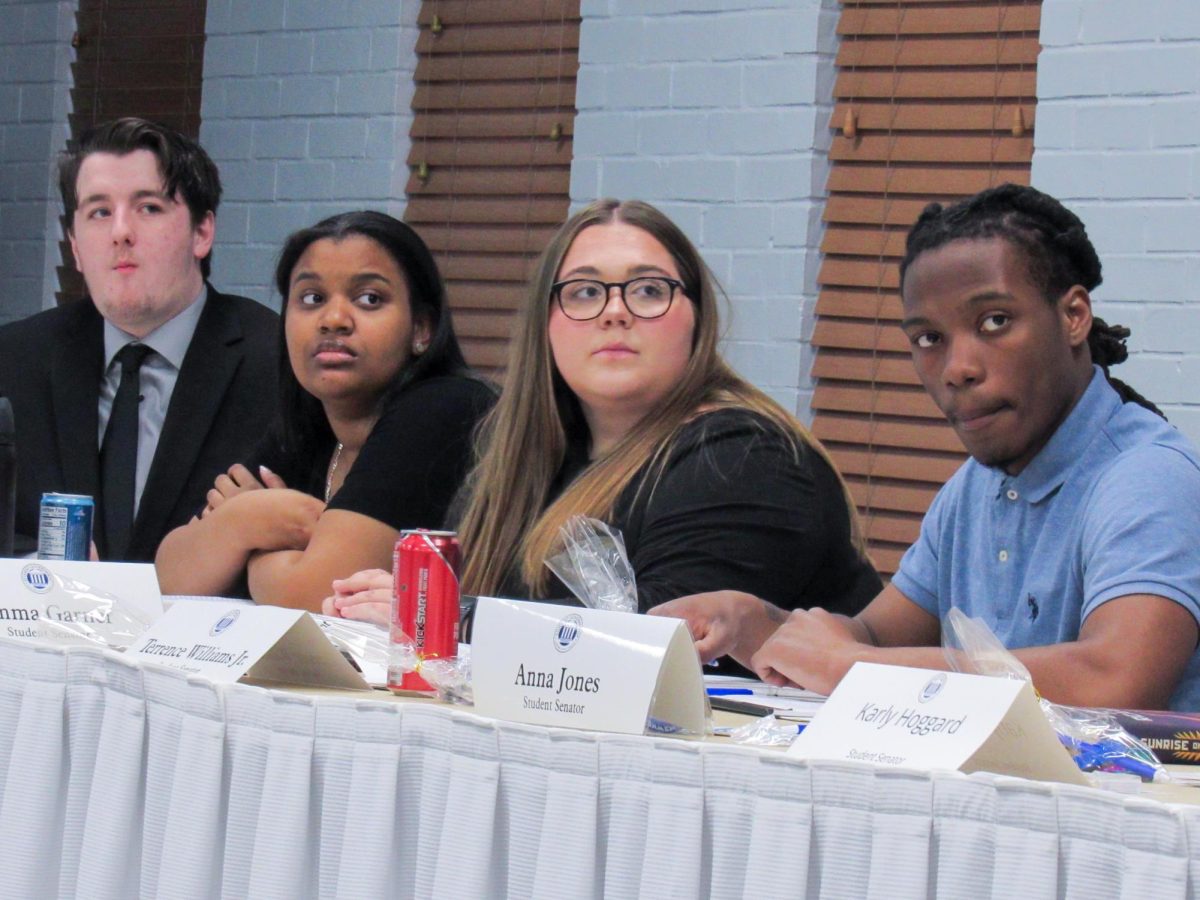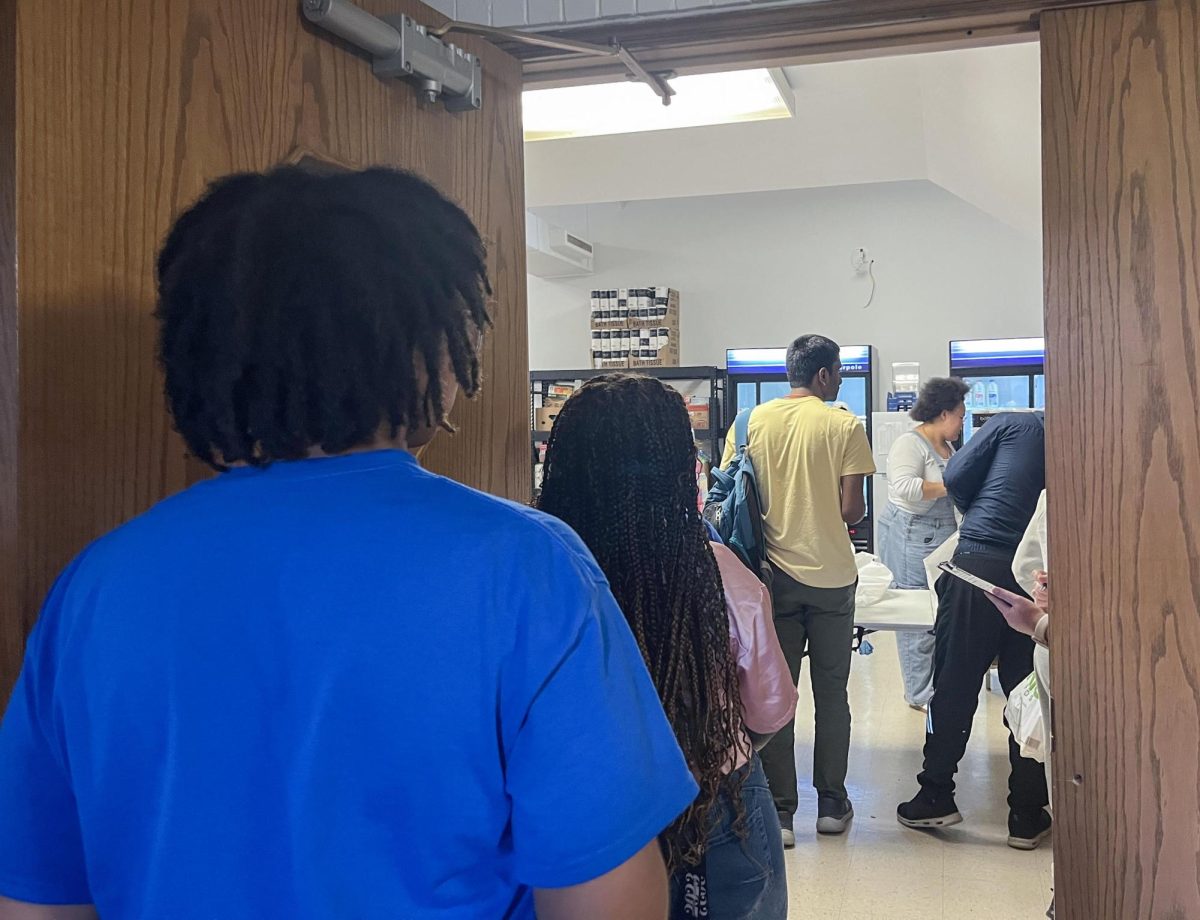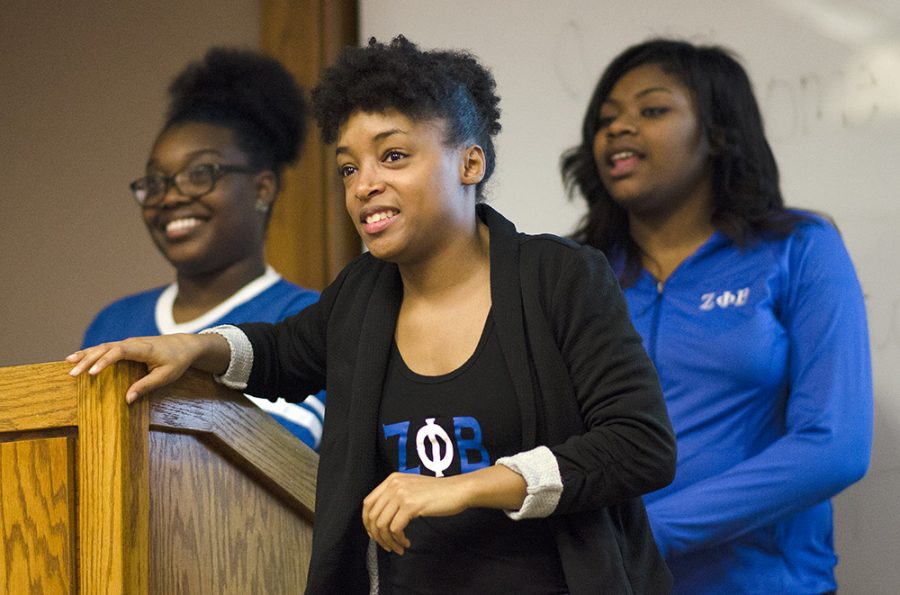Sorority discusses problems with blackface
Senior Hillary Fuller, center, a communications studies major, Sierra Snell, left, a junior psychology major and Kyla Dixon, a junior sociology major presented a “Black Face: Then and Now” discusion and interacted with audience members Monday in Lumpkin Auditorium.
February 20, 2017
The use of blackface to degrade the African-American community from the 19th century to today’s society was discussed Monday night by Zeta Phi Beta sorority.
In the past, white actors portrayed African-Americans in the media by painting their faces black and exaggerating stereotypical traits for entertainment.
The women of Zeta Phi Beta talked about the evolution of the degradation of black culture at “Blackface: Then and Now” in Lumpkin Hall Auditorium.
Hillary Fuller, the president of Zeta Phi Beta sorority, said an actor in the 1951 minstrel comedy show “Yes Sir, Mr. Bones” had his face painted black with white lips, bulging eyes and spoke with a “plantation dialect.”
Zachary Booth, a senior communication studies major, said the white lips are a symbol of “cotton mouth,” a degrading symbol meaning he “belongs in the fields” as a slave.
Minstrel shows were popular until the end of World War I, but the ideas degrading African-Americans were still prevalent in radio shows, Disney shows and other forms of media.
Jerrie Hinds, a freshman kinesiology major said they were disrespecting black people for the entertainment of white people.
One example the sorority pointed out was from the Disney movie “Dumbo,” where the black crows were portrayed as being poor, uneducated and ignorant.
Booth said tons of results showed up on YouTube when he searched for “racist Disney movies.”
Fuller said this degradation of black people and culture is still prevalent in present-day society.
Today’s media shows exaggerated versions of African-Americans, which all relate back to blackface, James Bateman, a senior communication studies major, said.
Sierra Snell, treasurer of Zeta Phi Beta said there are new forms of blackface, such as when people use it to mock the Black Lives Matter movement and when people paint their faces black with charcoal masks.
A controversial issue from last year involved students from Albright College in Reading, Pennsylvania. The students made Snapchat videos with their faces painted brown with a mud mask, and they mocked the Black Lives Matter movement and African-American culture.
Kaylan Moore, a sophomore family and consumer sciences major, said the girls who made those videos were racist before putting the mud mask on.
Fuller pointed out celebrities like Kylie Jenner who she said are commercializing black culture.
“When people take my skin and use it as a trend or wear my face as a mask—I promise you, that’s the problem. That’s the issue,” Fuller said.
Moore said these people are appropriating black culture by tanning to get darker skin and making their lips bigger.
“Although it’s degrading on multiple levels, look at it optimistically – they love black culture,” Booth said.
Kennedy Nolen can be reached at 581-2812 or kdnolen@eiu.edu.








![[Thumbnail Edition] Senior Foward Macy McGlone, getsw the ball and gets the point during the first half of the game aginst Western Illinois University,, Eastern Illinois University Lost to Western Illinois University Thursday March 6 20205, 78-75 EIU lost making it the end of their season](https://www.dailyeasternnews.com/wp-content/uploads/2025/03/WBB_OVC_03_O-1-e1743361637111-1200x614.jpg)
![[Thumbnail Edition] Junior right-handed Pitcher Lukas Touma catches at the game against Bradley University Tuesday](https://www.dailyeasternnews.com/wp-content/uploads/2025/03/MBSN_14_O-e1743293284377-1200x670.jpg)


![[Thumbnail Edition] Eastern Illinois University baseball senior utility player Tyler Castro fields a ground ball during the team's first intrasquad scrimmage of the season on Jan. 31.](https://www.dailyeasternnews.com/wp-content/uploads/2025/03/BB_01_O-e1742874760130-1-e1742907504722-1200x911.jpg)
![[Thumbnail Edition] Senior tennis player Luisa Renovales Salazar hits the tennis ball with her racket at the Darling Courts at the Eastern Illinois University campus in Charleston, ILL.](https://www.dailyeasternnews.com/wp-content/uploads/2025/03/Tennis_01_O-1-e1741807434552-1200x670.jpg)





































![The Weeklings lead guitarist John Merjave [Left] and guitarist Bob Burger [Right] perform "I Am the Walrus" at The Weeklings Beatles Bash concert in the Dvorak Concert Hall on Saturday.](https://www.dailyeasternnews.com/wp-content/uploads/2025/03/WL_01_O-1200x900.jpg)
![The team listens as its captain Patience Cox [Number 25] lectures to them about what's appropriate to talk about through practice during "The Wolves" on Thursday, March 6, in the Black Box Theatre in the Doudna Fine Arts Center in Charleston, Ill.](https://www.dailyeasternnews.com/wp-content/uploads/2025/03/WolvesPre-12-1200x800.jpg)



















